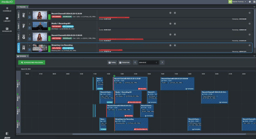AV Truth: Command Centers

Welcome back to AV Truth, a weekly series where we go beyond the glossy product shots and get into what really happens in the field. If you missed Week 1, we uncovered the hidden mistakes behind meeting room design.
Now, let’s talk about command centers, and no, they’re not just “bigger meeting rooms.”
These are high-stakes environments where clarity isn’t a luxury, it’s mission critical. Where one glitch, one lag, or one misplaced alert can mean lost revenue, failed oversight, or even a full-blown emergency.
You don’t build a command center to impress. You build it to function when things go wrong.
The Real Challenges No One Talks About
Operator Exhaustion
24/7 operations mean long shifts and constant screen exposure.
If your brightness, contrast, font size, or seating layout isn’t right, the system may survive but your operators won’t.
Awareness of Cases
More screens ≠ more control.
It’s about surfacing the right data, at the right time, for the right person.
Too much = noise.
Too little = blind spots.
Control Logic
That stunning GUI in your demo? Irrelevant in a crisis.
Can someone new walk in and take control in under 60 seconds?
If not, it’s not ready.
The Myth of the One Big Screen
Everyone loves a massive video wall until they realize it’s just a bigger place to get confused.
Here’s the truth:
A weak content strategy on a huge wall is just a giant waste of pixels.
Design the wall around workflow, not WOW factor.
Layer in context. Highlight urgency. Let the right information speak louder than everything else.
What Actually Makes a Command Center Work
- Clear visual hierarchy and screen zoning
- Operator-first ergonomics and seating
- Lightning-fast signal routing and input switching
- A control interface that respects urgency
- Redundancy you hope you’ll never need, but absolutely must have
Command centers aren’t showpieces. They’re pressure-tested spaces designed to support decisions when there’s no time to think twice.
If you’re building one, skip the catalog glamour shots and start with a single question:
“Can this room help the team make the right call under pressure?”
That’s Week 2 of AV Truth.
Next week, we step into a space that often gets overlooked but is critical to long-term success: training rooms.
Because it’s not just about delivering content. It’s about making sure people absorb it.
In the meantime, I’d love to hear from you,
What’s one hard-earned lesson you’ve learned while working on command centers?
Drop your thoughts in the comments.
-
Xchange Advocates are recognized AV/IT industry thought leaders and influencers. We invite you to connect with them and follow their activity across the community as they offer valuable insights and expertise while advocating for and building awareness of the AV industry.
Recommended Content
Creating the Next Generation AV Workforce: From Audio Engineers to Solution Designers






Please sign in or register for FREE
If you are a registered user on AVIXA Xchange, please sign in
Nailed it @Mohannad Mousa, CTS especially on control logic !
In a real crisis, no one’s clicking through nested menus.
If an interface isn’t intuitive under pressure, it fails.
Love the focus on operator-first design.
Keep these coming
Thanks a lot!
Totally agree, control logic has to be clear, fast, and operator-first.
Great Article @Mohannad Mousa, CTS So many Control Center projects start with the show piece in mind and don't focus on the true operational aspects of the project. Operator and Function First. It can still be beautiful, but function over form.
Thank you Nathan.
Designing with operator workflow and mission-critical function in mind is what makes the difference.
I love the weekly series idea @Mohannad Mousa, CTS
Thank you!
Really glad to hear that..